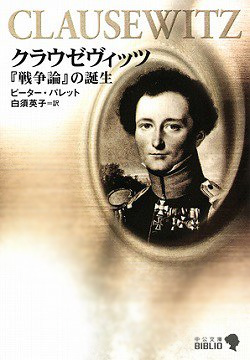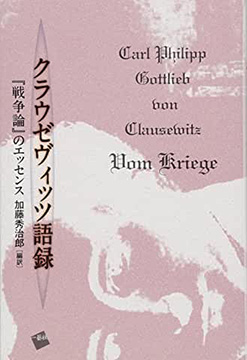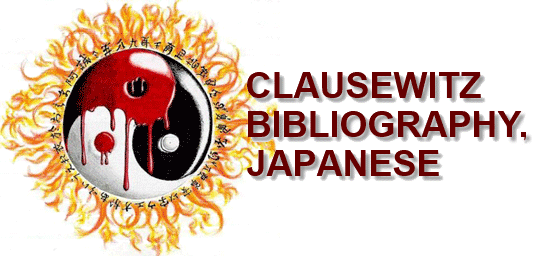
Clausewitz in Amazon.com Japan
The Clausewitz Society of Japan [「日本クラウゼヴィッツ学会」] http://www.clausewitz-jp.com/
See also our bibliographies in English, French, German, Spanish-Portuguese, Complexity Science, and "Other."
Michael Howard (citing Hahlweg's introduction to the 16th German edition, 52) noted in his introductory essay to On War ("The Influence of On War"), 37-38, that Vom Kriege's publisher, Dummlers Verlag, sent an advanced copy of the fifth edition to Japanese General Count Jamemoto Kuroki (1844–1923) in 1904. Kuroki, victor over Russia in the battle of the Yalu, responded that Clausewitz's work had already been translated into Japanese and had been a significant influence on Japan's conduct of the war. Just which work of Clausewitz—and which translation-Kuroki was referring to is problematical. Some Japanese officers being trained in Germany became familiar with Clausewitz c.1887. At some point, a Japanese translation of the Principles of War was made, evidently based on a French translation: Taisen gakuri, published by the Gunji Kyoiku Kai (Association for Military Education) in 1903 if not before.
On War itself was translated by Mori Ogai (a medical oficer in the Imperial Army better known as a novelist and poet), as Senso ron beginning in 1899. Mori had earlier (1888) translated portions of the book orally at the request of Japanese officers in Germany. Mori produced copies, but it does not appear to have been officially published as a book; parts of it appeared as a serial in a local newspaper, Moji Shinpo, in February-May, 1904. Shimada Kinji, Amerika Ni Okeru Akiyama Saneyuk (Tokyo: Asahi Shinbunsha, 1975), 252–253.) It appears in Mori's collected works.
There appear to be at least two other Japanese translations of On War: Karl von Clausewitz, trans. Shinoda Hideo, Senso ron (Tokyo: Iwanami Shoten, date uncertain), 3 vols. [Encyclopedia Japonica (Tokyo: Shogakugan, 1968), v.6, p273]; trans. Tantoku Saburo, Senso ron, Genda in No Tame No Koten Sirizu 10 (Tokyo: Tokuma Shoten, 1965).
There are a number of major commentaries: Hasegawa Keitaro, "Senso ron" o yomu: Ima naze Krausewittu ka, kaku no jidai no senso to seiji no tetsugaku ("Essay on `On War' with practical application to today's society," evidently a businessman's guide), Nijuisseiki Toshokan (Tokyo: PHP Kenkyujo, 1983); Ohashi Takeo, "Senso ron" Kaisetsu: "Senso ron" to Senshi (Commentary on On War) (Tokyo: Nihon Kogyo Shinbunsha, 1983). (Translations courtesy Sumiko Otsubo of OSU, 1990.)
There is also a reference in a German bibliography to three works in Japanese, but the information is sketchy and it is not clear whether they are articles (as seems most likely) or books. Translated into English, the three works are:
1. Goda, Yutaka. The Life of Carl von Clausewitz. Tokyo, 1982.
2. Ido, Mitsuaki. The Foreword of the Work, On War. Tokyo, 1982.
3. Ohhashi, Takeo. Explanations of the Foreword to On War. Tokyo, 1982.
See also Yugo Asano, "Influences of the Thought of Clausewitz on Japan since the Meiji Restoration," in Ulrich de Maizière (Hrsg), Freiheit ohne Krieg. Beiträge zur Strategie-Diskussion der Gegenwart im Spiegel der Theorie von Carl von Clausewitz, Bonn: Dümmlers Verlag, 1980, pp.379–396.
Yasuyuki Kawamura, “Historiography: For the Study on Clausewitz,” The Journal of Strategic Studies (Japan), No. 1, 2003, pp. 111-171.
The following items are listed by Dr. Takeshi Oki, "Clausewitz in the 21st Century Japan," pp.204-210 of Clausewitz Society [Clausewitz Gesellschaft, Hamburg]. Pommerin, Reiner, ed. Clausewitz Goes Global: Carl von Clausewitz in the 21st Century. (Commemorating the 50th Anniversary of the Clausewitz Society.) Berlin: Carola Hartmann Miles Verlag, 2011. ISBN: 9783937885414.
Yugo Asano," Clausewitz to kindai nihon" (Clausewitz and the Modern Japan) 3-1, Rikusen Kenkyu (Studies of Land Warfare), No. 328, 1981, pp. 27-30.
Georg Kerst, Jacob Meckel: Sein Leben, sein Wirken in Deutschland und Japan, Göttingen 1970.
Tohru Maehara, "Nihon rikugun e no Clausewitz no eikyou" (The Influence of Clausewitz upon Imperial Japanese Army) 1, Gunji-Shigaku (Military History Studies), Vol .19. No.1, 1983.
Yugo Asano, "Clausewitz to kindai nihon" (Clausewitz and Modern Japan) 3-2, Rikusen Kenkyu (Studies of Land Warfare), No. 329, 1981, pp. 11-14.
Takichi Shimizu/Tomoyuki Ishizu (ed.), Clausewitz to sensoron (Clausewitz and ‘On War’), Tokyo, 2008.
Takichi Shimizu, "Clausewitz no shogai--Clausewitz to Napoleon sennso" (The Life of Clausewitz—Clausewitz and the Napoleonic Wars).
Yasuyuki Kawamura, "Clausewitz no 'sensoron toha nanika" (What is Clausewitz’s ‘On War’), both in S/I. [Yu Tiejun, also writing in Pommerin, ed., also lists Yasuyuki Kawamura, "Historiography: For the Study on Clausewitz," The Journal of Strategic Studies (Japan), no.1, 2003, pp.111-171.
Masaki Miyake, "Doitsu ni okeru Clausewitz kennkyushi o chusin to site" (Introduction of the literature on Clausewitz focusing on the studies in Germany).
Takashi Araya Jyukyuuseikisyotou no yoroppa senryakukankyou to puroisen (The European strategic environment and Prussia in the beginning of the 19th century).
Hiroto Maruhata, Clausewitz and the age of the general conscription system.
Tadashi Suzuki, Puroisen Gunseikaikaku—gaikan to tenbo (Prussian military reform—an outline and the prospect), all in S/L.
Hiroki Nakajima, Puroisen-doitsu gun to Clausewitz (The Prussian-German army and Clausewitz).
Jun Kozutsumi, Sennryaku naki jidai no Clausewitz—Sennkannki no doitu o chusin ni (Clausewitz in the era without strategy—With the emphasis on Germany between the World Wars).
Tomoyuki Ishizu, Clausewitz to Liddell Hart—Zettai senso' to 'Seigen senso' no sokoku? (Clausewitz and Liddell Hart—An antagonism between ‘Unlimited War’ and ‘Limited War’?), all in S/L.
Satoshi Nagasue, Clausewitz no sennryakugainen to air power (Clausewitzian concepts of strategy and air power), in S/L.
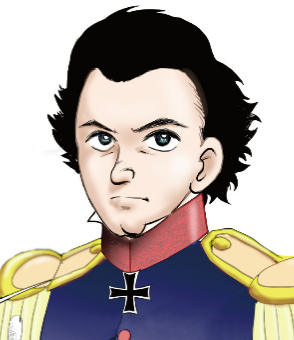
From a book "To Understand Clausewitz's 'On War' with Cartoons" mentioned by Takeshi Oki without a citation, presumably 漫画クラウゼヴィッツと戦争論 (日本語) 単行本(ソフトカバー).
SEE ALSO: Bibliography listed in Japanese Wikipedia article on Clausewitz.
Library of Congress's on-line catalog
We found 5 references in the Library of Congress's on-line catalog to items in Japanese related to Clausewitz:
1. Kurauzevittsu no heigaku, 1942, Sakabe Goro cho, call number U21.C55516 1942.
2. Wa-Kan-Yo tosui yodan. [16 i.e. 1941] 2, 2, 3, 306 p. illus. 19 cm. Romanized, call number U102.O48.
3. Vom Kriege. Japanese Taisen gakuri / Theorié de la grande guerre. Kurauzevittsu cho. Tokyo : Gunji Kyoikukai, Meiji 34-36 [1901–1903] 8 v. ; 23 cm. Vol. 3–8 has parallel title: Theorié de la grande guerre. Vol. 1-2: translated by Mori Rintaro in 1903, from German: Ueber den Krieg. Vol. 3-8: translated by Rikugun Shikan Gakko in 1901, from French translation: Theorié de la grande guerre. Vol. 1-2 published in 1903. Vol. 5: 1907 printing; v. 5-8: 1908 printing. LC copy imperfect: v. 6, pt. 1-2, t.p. wanting; v. 1-2, t.p. and all after p. 210 wanting. 1-2. Senso no honshitsu - 3. Senryaku hen - 4. Sento hen - 5. Heiryoku hen - 6. Shusei, sangaku bogyo - 7-8. Kosei hen. Call number U21.C55516 1901.
4. Kurauzevittsu no angobun. Hirose Takashi. Tokyo : Shinchosha, 1984. 283, [2] p. : ill. ; 20 cm. Bibliography: p. [284]. Call number U21.2 .H55 1984.
5. "Sensoron" o yomu Hasegawa Keitaro. Kyoto : PHP Kenkyujo, 1983. 226 p. : ill. ; 18 cm. Series: Nijuisseiki toshokan ; 0027. Call number U102.C6643 H37 1983.

............

............

............
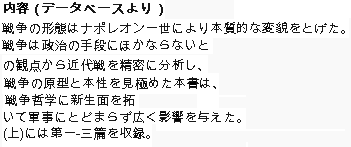
...........
クラウゼヴィッツ―『戦争論』の誕生 (中公文庫BIBLIO) [文庫]
ピーター パレット
クラウゼヴィッツ語録 ―『戦争論』のエッセンス
加藤 秀治郎 (著, 編集, 翻訳)
ISBN-10: 4863591314
ISBN-13: 978-4863591318
クラウゼヴィッツの『戦争論』は、「戦争についての最高の古典というだけでなく、唯一の古典」と評される名著だが、内容が複雑な上に翻訳書も難解で、まさに「有名だが読まれざる古典」の代表格となっている。本書は、この状況を打破する突破口とすべく、『戦争論』からエッセンスを抽出し、平易な訳文で収録した「語録」である。一般読者にも十分理解でき、『戦争論』の全体像を把握できよう。二度の大戦を経ながらも、なおも戦争の絶えない現代社会にあって、本書に触れ、「戦争の本質」を考えてみる意義は深いことであろう。
Clausewitz Quotations: The Essence of On War
Shugiro Kato (Author, Editor, Translator)
ISBN-10: 4863591314
ISBN-13: 978-4863591318
Clausewitz's On War is a masterpiece that has been described as ``not only the best classic on war, but the only classic.'' It is the epitome of "classic." This book is a "word record" that extracts the essence from "Theory of War" and records it in plain translation, in order to break through this situation. General readers will be able to fully understand it, and they will be able to grasp the overall picture of "Theory of War." In a modern society where wars are still unending despite two world wars, this book is of deep significance for us to think about the "essence of war."
| Return to top |
|---|





